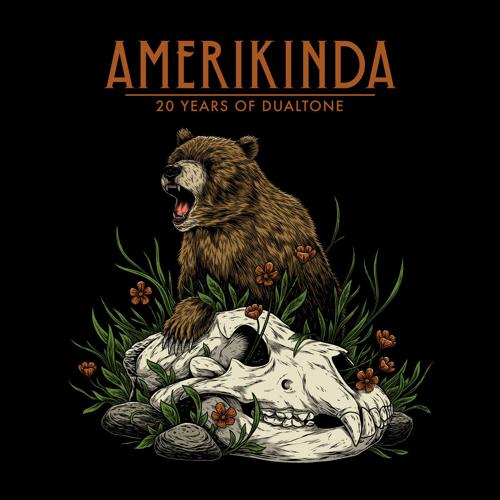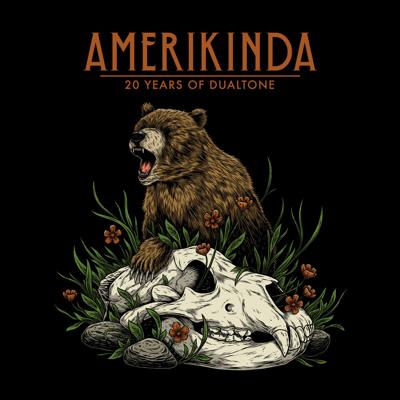Twenty years ago, when Nashville record label Dualtone Music Group opened for business, the concept of Americana music existed in a primordial state. It was the era of the Coen brothers’ mythological roots-music film O Brother, Where Art Thou?, rock-country bands like Whiskeytown and Old 97’s, and singer-songwriters on the order of Gillian Welch and Rodney Crowell. All these years later, the genre might define Nashville music as much as mainstream country does, and that’s partly due to the efforts of Dualtone. Of course, Americana isn’t just about Nashville, just as Dualtone’s catalog contains what you might call Americana-adjacent music. Still, Dualtone’s philosophy of record-making and music marketing has helped define a musical ethos that shows no sign of fading away.
Dualtone, which has been headquartered in Nashville since it began in 2001, has marked its two decades in the music business with a 15-track compilation that was released in August. Amerikinda features some of its best-known artists covering songs by other Dualtone artists. One of Dualtone’s emblematic acts, the Colorado prog-pop-Americana group The Lumineers, covers “Caves,” a 2018 song by fellow Dualtone singer Gregory Alan Isakov. Meanwhile, the late, great Texas-Nashville songwriter Guy Clark — whose late-career recordings for the label represent some of his richest work — gets the modern Americana treatment via a cover of his “My Favorite Picture of You” by the Austin, Texas, band Wild Child.
These days, Dualtone functions as a record label, but the role of labels has changed radically in the past couple of decades. In 2018, Dualtone bought a subscription vinyl business, Magnolia Record Club, which was started by Nashville musician Drew Holcomb, a Dualtone artist. Keeping a foot in the physical record business has helped the label keep its profile high, but it also lives in the world of streaming services.

Scott Robinson
Unlike most labels that operated in the heyday of the traditional record business, Dualtone makes what are called net deals with their artists, with the label and artist splitting the net profits from their projects. As Dualtone CEO and co-founder Scott Robinson tells the Scene via phone, using the net-deal concept is one of the ways the label strives to serve its artists.
“We felt like doing net deals was a way to have complete transparency with the artist, and have more of a partnership relationship,” Robinson says. “Because all these artists have a history of touring and being self-sufficient to some degree, I think this was a natural progression for them.”
As Robinson says, Dualtone functions in some ways like a marketing company, signing acts who have already established a reputation through touring. Still, as label president Paul Roper explains, it’s a little more complicated than that.

Paul Roper
“We’re trying to make the artists feel the fact that their album is more than a marketing tool,” says Roper, who joined the label in 2002. “It’s a revenue stream. Sometimes, in the bigger systems, there’s this relationship set up where the label is the bank, and the record’s a marketing tool to sell tickets and drive everything else.”
It’s difficult to choose one act that defines Dualtone, since the label sports releases by Nashville spoken-word artist Minton Sparks, Chuck Berry and singer-songwriter Hayes Carll. The aforementioned Lumineers may have made the records that best represent the label’s aesthetic. What you hear on the band’s breakthrough self-titled 2012 album is a synthesis of early-1960s folk and light touches of prog rock. The album traffics in themes of young-adult ecstasy, with almost none of the angst or overt experimentation of earlier folk-rock bands like, say, Fairport Convention.
The success of The Lumineers makes them similar to Mumford & Sons, The Avett Brothers and The Civil Wars, all of whom made their mark by marrying the simplicity of folk-derived music with the optimism of pop. For all that, the sound of The Lumineers — like that of another popular Dualtone group, Mt. Joy — serves as a corrective to the notion that Americana continues to be nothing more than a version of old-time roots music. For one thing, Mt. Joy has achieved the kind of success that ’70s roots-country bands like Commander Cody and His Lost Planet Airmen never achieved. The band’s 2017 single “Silver Lining” hit No. 1 on Billboard’s Adult Alternative Airplay chart.
Like any significant record label, Dualtone has served the forces of commerce while paying respect to history. For my money, it has honored history most fruitfully by releasing Chuck Berry’s 2017 album Chuck, which is the inventor of rock ’n’ roll’s final album. It sums up Berry’s music without resorting to nostalgia. Roper tells me Dualtone will issue Berry’s Live From Blueberry Hill in December. It’s composed of performances Berry gave in 2005 and 2006 at the eponymous St. Louis venue.
“Scott and I, when we put out the Chuck studio record, we got a chance to go to St. Louis and visit with his son and daughter, and Mrs. Berry,” Roper says. “It was a pinch-yourself moment when they’re opening up family archives and scrapbooks, just walking us through. It was incredible.”










